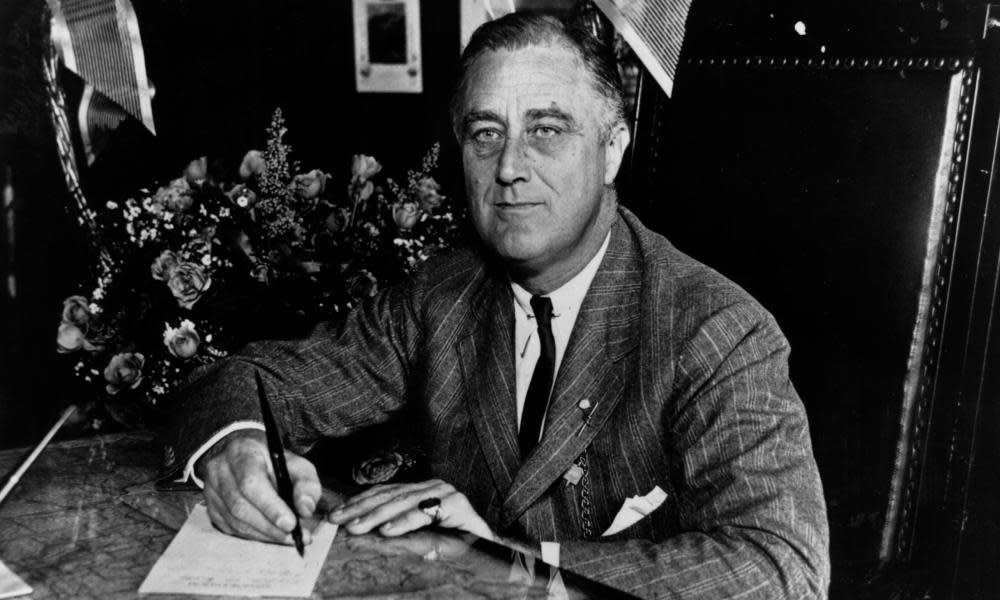Without clarity and leadership, there's plenty to fear for the UK economy

It was the sort of speech Boris Johnson used to make. Britain is on course for the most spectacular quarter of growth in its history. Consumers are spending freely on houses and cars. Good news about the economy is being crowded out by the doomsters and gloomsters in the media. As Franklin Delano Roosevelt once said: “The only thing we have to fear is fear itself.”
This, though, was not the prime minister, because since the start of the coronavirus crisis Johnson has turned from Tigger into Eeyore. Instead it was left to the chief economist at the Bank of England, Andy Haldane, to make the sort of rallying cry that was once the PM’s trademark, hitting out at those determined to wallow in pessimism. The Threadneedle Street official called it the economics of Chicken Licken, after the fictional fowl who, having been hit on the head by an acorn, felt the sky was about to fall in.
Haldane’s speech might have been better timed. This, after all, was the week when the death toll from Covid-19 passed the million mark, the number of new cases in the UK reached a record daily level, and one-third of employers surveyed said they were likely to announce redundancies in the next three months. Some acorn.
That said, Haldane has a point. The economic news has been better – a lot better, in some respects – than was expected when the UK was in full lockdown, between late March and early May. The recovery in consumer spending has been remarkable.
It is also true that there is a disconnect between the low levels of consumer confidence and actual spending patterns. Individuals have been telling pollsters that they are uncommonly downbeat about the prospects for the economy, but that hasn’t stopped them applying for a mortgage or trading in their car for a new model.
This seeming conundrum is actually easy to explain. Although economic output contracted by almost 20% in the second quarter, disposable household incomes barely fell at all. The government has so far picked up the tab, paying the wages of the millions of workers who were furloughed when the economy was locked down. For the first few months of the crisis, households saved money. When the restrictions were eased they went on a bit of a spending spree using some of the cash they had squirrelled away.
As a result, the first six months of Covid-19 have been something of a phoney war. There has been pain, but it has been much less severe than might have been expected given the drop in output. The tricky bit starts now because, as Haldane acknowledged, the UK faces an “unholy trinity” of risks: a rising Covid-19 caseload that is leading to local lockdowns and the reimposition of national restrictions, higher unemployment, and the possibility of a no-deal Brexit.
Leadership matters, and it would help if Johnson could articulate his message as clearly as FDR did when he blamed the Great Depression on speculative excesses of Wall Street, said mass unemployment would not be tackled merely by talking about it, and declared that he would treat the crisis as seriously as if America had been invaded.
That, however, would require the government to decide what its strategy is, because it can’t seem to make up its mind whether the aim is to manage the virus, to suppress it, or a mixture of the two. Britain needs its equivalent of the New Deal; what it is getting is muddling-through.
In August, when the number of new cases was low, Rishi Sunak was encouraging people to dine out on the Treasury in order to boost the struggling hospitality industry. The public, flush with cash, didn’t need much persuading to take advantage of the cut-price offer.
A month after the end of “eat out to help out”, restaurants now have to turf customers out by 10pm, meaning in effect that they can arrive no later than 8-8.30pm. There is talk of another national lockdown – a two-week circuit breaker – in response to the recent surge in Covid-19 cases. This sort of zig-zagging breeds fear.
If the government decides that coronavirus trumps all other considerations, ministers must do whatever is necessary to minimise the knock-on impacts on the economy: to stop businesses from going bust, to provide financial help for especially vulnerable sectors, to extend more generous welfare payments, and to have local furloughs where there are local lockdowns.
But where there should be clarity, there is confusion. The chancellor says he is focused on saving as many jobs as possible but is scaling back support to the labour market because the Treasury is uncomfortable about the cost of fighting Covid-19. Sunak is clear that the deficit – which will be bigger this year than ever before in peacetime – has to come down. Measures aimed at doing just that have been postponed, not abandoned.
Here too there is an echo of FDR, who watered down the impact of the New Deal by cutting spending before the economy had fully recovered, and sent the US plunging back into recession in 1937. The Great Depression really came to an end only when the need to prepare for war meant budgetary considerations were no longer relevant.
This is the real lesson from the 1930s and early 1940s. Either Covid-19 represents a threat that will soon disappear, or it is an existential threat. If the former, there is no point in cratering the economy to combat it. If the latter, there should be no expense spared to protect jobs and businesses. Nobody asked the chancellor of the exchequer whether more Spitfires could be afforded in the summer of 1940. Wars are not won by soundbites, however memorable.
• Larry Elliott is the Guardian’s economics editor

 Yahoo News
Yahoo News 
